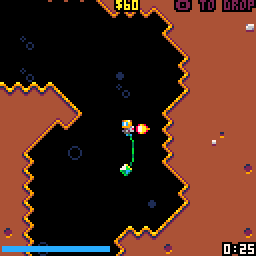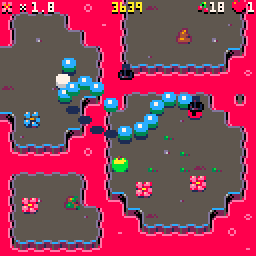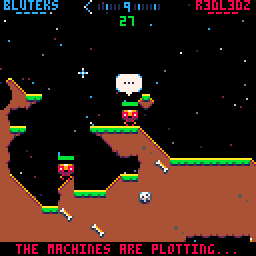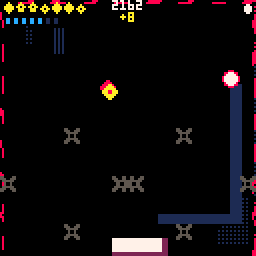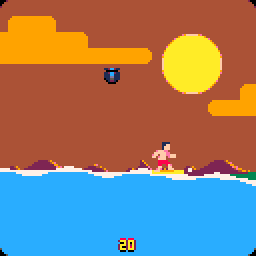It's been almost three years since my last update on this blog, and all RGCD products have been out of stock on the website since Summer 2021. What's been going on? Whatever happened to Yoomp! on the Amiga? What about EFMB or Retaliate DX for the C64? Is James Monkman dead?!
Well, first off, the good news - I'm not dead or ill, nor have I been kidnapped or gone into exile. The truth is a lot less interesting to be honest, but as several concerned people have reached out me during my extended absence I'm going to take the time now to bore you all with the details.
Early in 2021, my family and I decided that we'd use the stamp duty holiday in the UK to move a step up the property ladder. Stamp duty is a land tax that is payable every time you purchase a property here in the UK, and to stimulate the housing market during the COVID outbreak the Government put a temporary exemption against it. We had outgrown the terrace house we had in Exeter, and after a year of lockdown we all really wanted a change.
My wife is a social worker and her office arrangements had changed from personal work areas to 'hot desking', with her now spending four-fifths of her time at home or on local visits. On the other hand, my railway planning job had evolved to me only being required in the office for 2-3 days a week, meaning that I was also at home for pretty much half of my working hours. With us both in key worker jobs during the outbreak, it didn't take long with five of us all working and schooling from home for the place to start to feel very, very small.
However, even with the tax break, we couldn't find anything suitable in Exeter, so we started looking further afield - Exmouth on the coast, and Crediton further inland, both towns that are connected to our places of work by train. After a couple of months, we found a house in Crediton that suited us - but unfortunately that purchase fell through following a terrible property survey (and the seller refusing to budge on the price). So there we were, looking again with only a few months of the tax break left, when I found a house that seemed to be too good to be true (spoiler; it was).
I grew up right in the middle of Devon, in a small, medieval market town called Hatherleigh that dates back to around 1081AD, and one day on my random property searches I came across a five bedroom house in the town with an attached two bedroom cottage that was almost within our budget. I went for a viewing and couldn't believe what I was seeing - for roughly the same price as our four bed terrace house, here was a larger property with a garden and courtyard, a separate cottage, two sheds/workshops, off-road parking and loads of potential. A forever home.
We pretty much threw caution to the wind and immediately made an offer, and after a few negotiations we had an agreement and began preparing for the move. With a train station opening in nearby Okehampton we were still mostly connected to the rest of the UK, although my commute is now a total of four hours a day! Looking back, I think we were all blinded by the promise of a healthier countryside life and the extra living space for our extended family to use on visits. We had a survey done on the property that resulted in a list of problems almost as thick as a telephone directory, but we didn't care - the house had been standing for centuries, so it would surely manage a few more years without any major investment from us?
As it turns out, not so. Within the first six months we had to completely renew the central heating system and change tens of metres of dodgy wiring in the main house (all the lights stopped working upstairs a few days after moving in). We spent a fortune on repairing leaking windows, lining the chimneys and recommissioning fireplaces - and that was just to get us ready for the first winter! In the meantime, we had to also deal with getting the kids admitted into new schools, rodent and moth infestations, painting and decorating and taking about 50 car loads of junk to the dump... And then, just as things started to settle, the exterior wall of the attached cottage collapsed!
Built in 1650 (or thereabouts), our house and the adjoining cottage mostly comprise of a mix of stone and cob. Cob, for those who don't know, is a blend of straw and clay-rich red mud. Unfortunately, on a side of the cottage that we lack access to, a gutter had been blocked and water had been running down the wall and into the cob through a crack in the exterior render for almost a decade. What happens if you add water to mud? It turns to a slurry and loses what few positive attributes it has as a building material. So, there I was, on my 42nd birthday in November, digging up a mountain spoiled clay and render from all over our neighbours garden and packing it into rubble bags for removal. In the rain, natch.
Following this disaster (and the huge expense of our initial renovations on the main house), my wife and I turned our attention to the two bedroom cottage. We had a second property here, albeit in very poor state of repair (with a collapsed exterior wall, remember!) but also with potential to become a future source of income to help us climb out of our financial hole. Our neighbours had a similar, beautifully renovated property on the square just around the corner that they rented out on Airbnb, and it was pretty much booked out on a permanent basis. With a little work, surely we could do something similar, right?
The renovation took us over two years to complete. Two years of working nearly every weekend in a building site. Two years of builders and tradesmen coming and going. Two years during which our mountain of debt grew and grew and grew.
It turns out that we were incredibly naïve in our aspirations to 'quickly' renovate the cottage. The first step in the process was to have an electrical safety test carried out - and unsurprisingly it turned out that the insulation score was the lowest our electrician had ever seen. This was mainly due to the shoddy 1980's installation, with wiring that ran unshielded and non-trunked through the thoroughly damp, mud walls. A complete rewire was in order if we had any hope of legally renting the place out. In addition to this, the boiler was not installed to a legal standard either, so hey, if we're rewiring we might as well redo all the plumbing, right?
We ended up borrowing and spending a small fortune on the work, but wow - that little two bedroom cottage now really puts our own home to shame. Everything was redone. All new plumbing and electrics, additional insulation in the vaulted ceilings, every wall re-plastered and decorated, oak floors put in downstairs and new carpet upstairs. We installed a new kitchen and a new bathroom. We even restored the original cottage entrance that at some point had been converted into a window. However, one thing we didn't do was to put it up on Airbnb.
Just days after the work was complete, one of our neighbours was evicted from his home (through no fault of his own). Hating to see an senior citizen and his dog thrown out on the street, we decided to help him out by offering our cottage as a rental property. It's taken some adjustment, but I feel that it was ultimately the right decision and we all get on well. Apart from our cat Bertie, who is not a fan of Lenny the dog.
It's taken me a few months to recover from all this - and we still have a lot of refurbishment left to do in our own house, so the work is far from over. In fact, we're currently in the process of fitting a new bathroom suite, with a bathtub currently residing in the dining room, waiting for installation (and raising eyebrows whenever we have visitors). Also, my day job has changed a great deal over the past four years. Since COVID my workload has almost doubled; where I used to be able to crunch my hours into four days and have a day to myself for RGCD activity, now I'm regularly working the equivalent of six days a week just to keep up.
My wife and I have also had to deal with helping our three kids to establish new friendships and integrate into the community. My eldest (Millie) has really flourished here - she's now studying art and philosophy at college and is out all the time with her new friends. However, my two younger sons have found the move a little bit more difficult and it's taken a lot more time and effort to settle them. This is probably also another consequence of COVID; they seem to be far more addicted to their screens than Millie - despite the endless opportunity for outside activities and adventure that living in the countryside offers.
From my perspective, moving to this small yet active rural community has been a really positive change. We have friends and neighbours whom just randomly call round for a cup of tea and a chat, and we are regularly out at each others houses for dinner and barbeques in the warmer months. We never had this in Exeter; despite having a great friendship group there, it was never so relaxed as to just have unexpected visits - I guess mainly because of how spread out across the city we were. In these days of smart phones and constant communication, there's something quite nostalgic about an unexpected knock at the door and a welcome, friendly face greeting you on the other side.
The unfortunate consequence of all this activity over the past three years has been that I've had zero time left in my schedule for sitting in front of a computer until very recently. In fact, I'm sat typing this on my Commodore 64 right now, and it must be the first time I've turned the poor neglected thing on in about six months.
So here I am, finally sat in front of an 8-bit machine bashing away on the keys with a grin on my face. I'm well aware that the C64 scene has evolved a great deal in my absence; I have a lot to catch up on and working relationships to rebuild. RGCD’s cashflow is currently zero, so I'll need to sort out my accounts and then promptly finish off the few outstanding tasks on projects that were already in the pipeline so as to bring funds back in to the business. Additionally, Brexit has introduced some major challenges for small businesses selling products outside the UK, so I'll have some work to do on that front, possibly resulting in me moving the RGCD shop away from Big Cartel.
In conclusion, there's a lot of work ahead of me, but rest assured, RGCD is back. While I labour away in the background, I also intend to update the blog a bit more frequently than one post every three years, so you'll probably be hearing from me again soon. Please note that the RGCD email inbox is currently backed up with thousands of messages (mostly spam), so until I catch up, if you want to drop me a line the best way is probably via a message on Facebook.









































